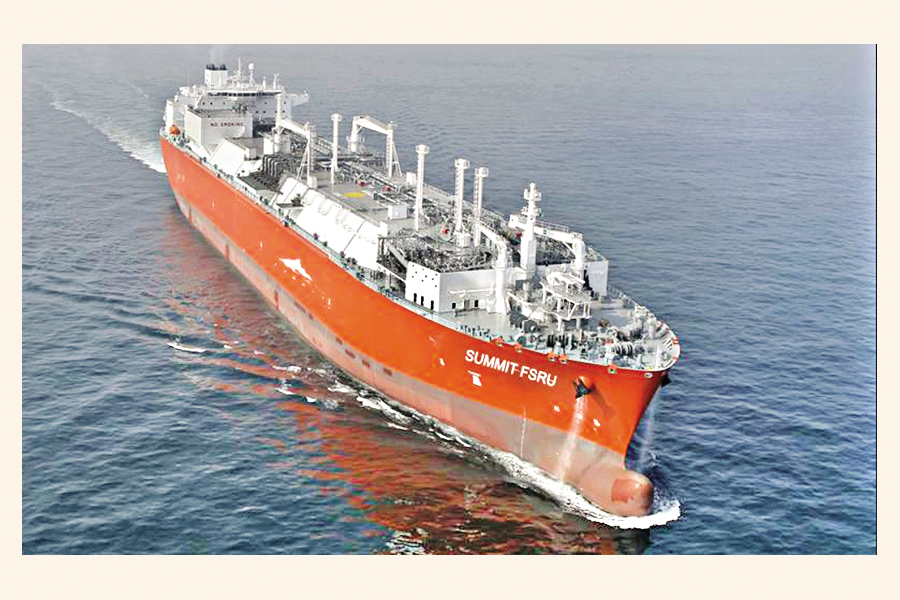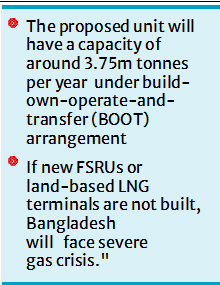
Published :
Updated :

OQ Trading International of Oman is planning to construct a floating storage and regasification unit (FSRU) in Moheshkhali in the Bay of Bengal in order to address the country's LNG regasification capacity constraints.
The company has already submitted a proposal to state-run Petrobangla to build the FSRU having a capacity of around 3.75 million tonnes per year under the build-own-operate-and-transfer (BOOT) arrangement.
"We've received a proposal from the OQ Trading to build an FSRU and are currently scrutinising it," Petrobangla Chairman Md Reznur Rahman told The Financial Express on Saturday.
Officials said Bangladesh requires more FSRUs and land-based liquefied natural gas (LNG) import terminals to expand regasification capacity against the backdrop of dwindling local gas reserves and output.
The country's natural gas production from local fields has currently declined to around 1,800 million cubic feet per day (mmcfd), a level last seen during 2008-09. Gas supply from local fields is on the decline since peaking in fiscal year 2016-17. Bangladesh recorded its highest-ever natural gas production on May 6, 2015, reaching 2,786 mmcfd, according to the official data of Petrobangla.
At present, Bangladesh operates two FSRUs and LNG regasification from them has recently reached saturation point, which hovers around 1,050 mmcfd against their combined capacity of 1,100 mmcfd.
"If new FSRUs or land-based LNG terminals are not built, Bangladesh will have to face severe natural gas crisis very soon," energy expert Prof Ijaz Hossain told the FE.
Bangladesh last month inked its first-ever short-term LNG supply deal with OQ Trading International aiming to boost gas supply and reduce reliance on the volatile spot market. The new sales and purchase agreement (SPA) will allow Bangladesh to import one LNG cargo per month from August 2025 through December 2026, totalling 17 cargoes. This marks the country's first-ever short-term LNG deal with a global supplier. Under the agreement, Bangladesh will import five LNG cargoes in 2025 and 12 in 2026, helping to ensure a more stable gas supply during periods of high demand.
For the first time, Bangladesh will buy LNG at prices linked to the Platts-assessed Japan Korea Marker (JKM), the benchmark index for LNG deliveries to Northeast Asia. The pricing under this short-term SPA includes a premium of 15 cents per million British thermal units (MMBtu) above the JKM rate.
Bangladesh now imports LNG from QatarEnergy LNG (formerly Qatargas) and OQ Trading International under long-term contracts, both tied to Brent prices. This new short-term deal, however, provides an alternative pricing mechanism.
Rupantarita Prakritik Gas Company Ltd (RPGCL), which handles LNG imports for Bangladesh, currently buys three to four spot cargoes a month on average. This number usually rises during the summer and Ramadan when gas demand spikes, especially from industrial sectors.
Bangladesh has two long-term LNG deals with OQ Trading. The first, signed in May 2018, runs through 2029 and allows imports of up to 1.5 million tonnes per year. The second, signed in June 2023, covers a 10-year period starting in 2026. Under this deal, it will import 250,000 tonnes of LNG in 2026, 1 million tonnes in both 2027 and 2028, and 1.5 million tonnes annually from 2029 to 2035.
Bangladesh received its first LNG cargo from OQ Trading on January 31, 2019. As of July 2025, the country has imported 125 cargoes from the company, totalling around 7.80 million tonnes.
Azizjst@yahoo.com


 For all latest news, follow The Financial Express Google News channel.
For all latest news, follow The Financial Express Google News channel.